
International Research Journal of Engineering and Technology (IRJET) e-ISSN:2395-0056
Volume: 11 Issue: 03 | Mar 2024 www.irjet.net p-ISSN:2395-0072


International Research Journal of Engineering and Technology (IRJET) e-ISSN:2395-0056
Volume: 11 Issue: 03 | Mar 2024 www.irjet.net p-ISSN:2395-0072
V. Suresh1 , M. Dinesh Kumar2 , K. Siddharth3 , A. Alex Livingston Raja4
1,2,3,4,Assistant Professor , Hindusthan College of Engineering and Technology ,Othakalmandapam , Tamilnadu , India ***
Abstract - Soil having the property to expand and shrink is known as cohesive soil. Cohesive soil is black cotton soil or fine soil. The major problem for geotechnical engineers is the black cotton soil is required to be treated before the construction of superstructures. There are several methods like Grouting, stabilization, etc for the treatment of black cotton soil. In this project, we investigated the properties of black cotton soil stabilized by palmyra fiber. The experiment covered the index property testes, vane shear test, Direct shear test and unconfined compression test. With the focus on improving the shear strength parameters, soil samples with different combination of palmyra fiber is prepared like 2%,4%,6%, and 8% palmyra fiber blended with natural soil, and the soil sample namely Pfbc-1, Pfbc-2, Pfbc-3, Pfbc-4 were tested under different shear tests. Results were discussed and an optimum proportion of palmyra fiber with black cotton soil is suggested based on the test results performed above
Key Words: Black Cotton Soil, Palmyra fiber, PFBC, Compaction tests, Optimum Moisture Content, and shear strength parameter of the Black Cotton Soil.
1.1. General
Alandfillsiteisalsoknownasatipdump,rubbish dump, garbage dump, or dumping ground is a site for the disposal of waste materials. A landfill is the oldest and most common form of waste disposal. As Landfills may contain a lot of chemical components it may affect the quality of the soil and also affects the vegetation in the area so by using palmyra fiber the usage of chemicals can be reduced and increase the vegetation in the particular areaoflandfills.Atthesametimestabilityoflandfillsmust be taken into accuracy for future use. A natural fiber that derives from the treatment of the palmyra palm is known as palmyra fiber. A large quantity of palmyra fiber is produced in southern and eastern India. As Using chemicalsforthestabilizationofthesoilresultsindamage to the quality of the soil and also affects the growth of crops in it. So by using palmyra fiber such conditions can be prevented and soil can be stabilized without affecting
thequalityofthesoil.Sowereintendtodiscovertheeffect ofpalmyrafiberontheshearstrengthofblackcottonsoil.
This paper is mainly aimed to get maximum information about the change in shear strength of black cotton soil available near Coimbatore and also observe the behavior whileaddedwiththepalmyrafiber.
ThebroadAresincludes:
Study the effect of palmyra fiber on black cotton soilwithvariousproportion
To produce the proper surface layer for backfills withoutaffectingtheenvironment.

International Research Journal of Engineering and Technology (IRJET) e-ISSN:2395-0056
Volume: 11 Issue: 03 | Mar 2024 www.irjet.net p-ISSN:2395-0072
Following process was done for investigate the Effect ofpalmyarfiberonBlackcottonsoil.
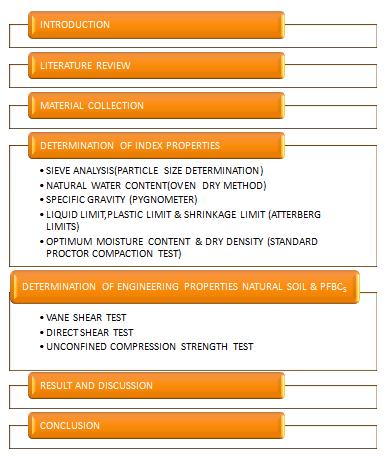
3.1 Mix Proposition
We collected Black cotton soil from the Coimbatore district. In Coimbatore district, the Black cotton soil is around 2687 sq. km. it contributes 57.62%. To create the proper bonding between palmyar fiber with Black cotton soil. Fibers were cut into a length of 2.5 cm. andmixedwithBlackcottonsoilondifferentcombinations like PFBC-1, PFBC-2, PFBC-3 and PFBC-4 (Palmyar fiber withblackcottonsoil-PFBC)
Table-1:MixProportion
Properties of materials
4.1 BLACK COTTON SOIL:
Index Properties of Black cotton soil were determinedasperIScodeandtabulatedbelow
Table 3: PropertiesofSoil
4.3
Adetailed experimental studyisdoneonpalmyra fiber blended with natural soil on a different combination of palmyra fiber prepared like 2%, 4%, 6%, and 8% by weight. Experimental study aimed at getting the detailed shearstrengthparametersofPFBCsamplesandtheresults

International Research Journal of Engineering and Technology (IRJET) e-ISSN:2395-0056
4.4 Direct Shear Test
Direct shear test Friction and cohesion of the
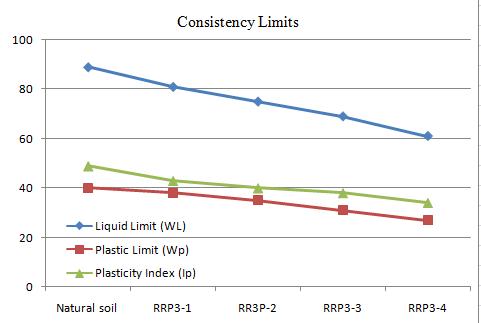
4.5 Compaction Properties
Proctor compaction tests were carried out on natural soil as well as prepared RRP3 samples. Variations in Optimum moisture content and maximum drydensityofRRP3samplesandNaturalSoilshowninthe figure2
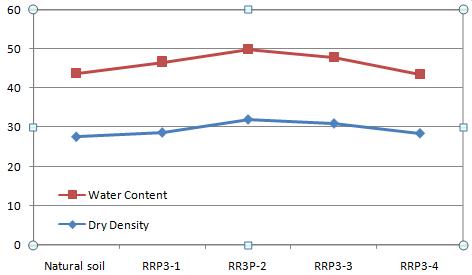
4.6 Unconfined Compression Strength
To find the unconfined compression strength and cohesive force developed on the soil with different proportions of powered Recorn - 3s. the UCC tests were conducted on natural soil and RRP3 samples, results of UCCtestswereshowninthefigure3
Volume: 11 Issue: 03 | Mar 2024 www.irjet.net p-ISSN:2395-0072 © 2024, IRJET | Impact Factor value: 8.226 | ISO 9001:2008 Certified Journal | Page596 of experimental study were given below samples is as follows.
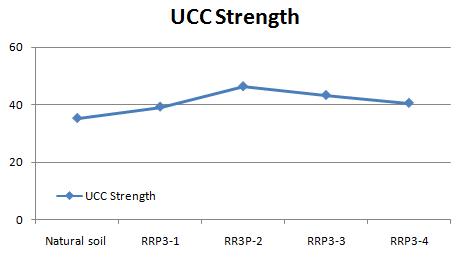
4.7 California Bearing Ratio
In order to calculate theCalifornia Bearing Ratio for naturalnatural soil and RRP3 samples, CBR tests were conducted and results were shown in the figure4
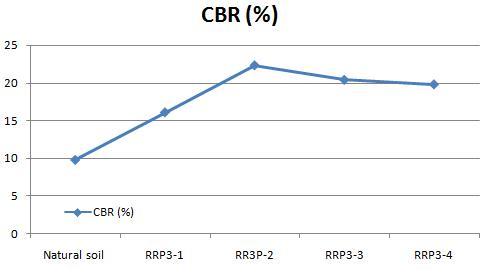
From all of the test results, it is observed that the Liquid Limit, Plastic Limit, and Plasticity Index values get decrease with the addition of PR3. It also shows the increase in Dry Density, Optimum Moisture Content, Unconfinedcompressionstrength,cohesion,andCalifornia BearingRatiowhileaddingthePR3.
(I) SoilwithPR3showsagradualreductioninthe LiquidLimit,PlasticLimit,andPlasticityIndex
(2) The soil having 2% PR3 may increase the Dry Density by 15.36% and the Optimum Moisture Contentby12.5%
(3) The soil having 2% PR3 may increase the unconfined compression strength by 31.23% and Cohesionby15.56%

International Research Journal of Engineering and Technology (IRJET) e-ISSN:2395-0056
Volume: 11 Issue: 03 | Mar 2024 www.irjet.net p-ISSN:2395-0072
(4) Soil with 2% PR3 may increase the California BearingRatioby127%
Inthisexperimentalwork,wedidseveraltestson natural and RRP3 samples to get a clear idea of the effect ofPR3inredclayaroundtheCoimbatoreregion.Fromthe result, we conclude that the maximum percentage of RP3 mixedwithredclayisintherangeof1%to2%.
IS I 2720 ( Part II ) 1973. Indian Standard. MethodsofTestforSoils.PartIIDeterminationof WaterContent.(SecondRevision).
IS 2720-3-1:1980 Methods of test for soils, Part 3: Determination of specific gravity, Section 1: Fine grained soils method of Indian Standards. Publicationdate
IS 2720(Part 5):1985 Methods of test for soils: Determination of Liquid and Plastic limit (second revision).Reaffirmed-May2015
IS-2720 (Part-8):1983 (Reaffirmed- May 2015) “Methods of test for soils: Determination of optimum water content - dry density relation usingheavycompaction”.
Mohammad Wasif and Mohit Bajaj, “A Review studyon The Soil Stablization With Recron-3S Fiber”International Journal of Latest Research in Science and Technology., Volume 5, Issue 3 , Page No.38-40,2017.
Sowmya Ratna.P, Dr. D S V Prasad and Dr. G V R Prasada Raju, “Performance of Recron-3S Fiber with Lime in Expansive Soil Stabilization”, IOSR Journal of Mechanical and Civil Engineering, Volume13,Issue6Ver.VI,PP74-79.2016.
A.K. Sabat, and S.K. Das, “Design of Low Volume RuralRoadsUsingLimeStabilizedExpansiveSoilQuarry Dust Mixes Subgrade,” Journal of Indian Highways,Vol.37,Issue-9,pp.21-27,2009.

Mr.V.SURESH
AssistantProfessor HindusthanCollegeof EngineeringandTechnology Coimbatore.



Mr.M.DINESHKUMAR
AssistantProfessor HindusthanCollegeof EngineeringandTechnology Coimbatore.
Mr.K.SIDDHARTH
AssistantProfessor HindusthanCollegeof EngineeringandTechnology Coimbatore.
Mr.A.AlexLivingstonRaja AssistantProfessor HindusthanCollegeof EngineeringandTechnology Coimbatore.